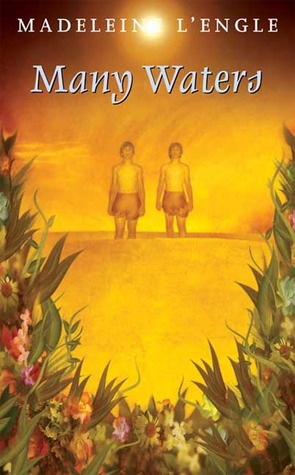Sandy and Dennys Murry come into their parents’ lab from the winter cold wishing for warmer conditions. The next thing they know, they have been whisked away to a strange place where the sun is hotter than hot, the people smaller than average, and the wildlife consists of creatures like mammoths, manticores, and unicorns. Though each of the boys temporarily succumbs to heatstroke, when they are well, they each realize they have landed in Biblical times just before the story of Noah’s ark takes place. Though they have been cautioned by seraphim not to meddle too much with history, they can’t help but love some of the people they meet and wish to save them from their inevitable fate in the great flood.
I have such a hard time settling down to read the books in the Time Quintet. I always breeze through the Austin books, and even the ones about Polly O’Keefe, but the stories in this particular series are always just outside of what my literal mind likes to explore. It took me especially long to get around to this book because I disliked A Swiftly Tilting Planet so much, and I was concerned that this next book would be equally as disappointing. As it turns out, I wasn’t completely off the mark, but Many Waters was more enjoyable than I expected.
I like the way L’Engle incorporates Biblical story with fantasy. I had to do some research as I was reading to remind myself which characters were truly named in the Bible, and which were invented by L’Engle, but that is a testament to my poor knowledge of the Bible, and not a flaw in the story. In fact, I think it’s great that this book treats the reader intelligently and encourages him or her to read the story of Noah’s Ark and to think more critically about it. I think the religious aspects of this book are what kept me reading, even when I was rolling my eyes about shape-shifting angels who turn into pelicans and scarab beetles, and unicorns that don’t exist, but only “tend to be.” (I just can’t help but laugh at these things. They are equally silly in and out of context.)
I also like that this book is about the twins, and that it focuses on them as individuals, rather than as part of their larger family. Though this isn’t strictly a coming of age tale, I like the way the two boys are changed by their experiences in the past, and I like that they, who are normally so literal-minded, are able to accept the strange events they witness. It made it a little easier for me to swallow some of the fantastical elements - probably as easy as it will ever be for me to do so. It was also sort of a relief to be free of the “specialness” of Meg and Charles Wallace that has so dominated the other books.
Some sections of this story are very well-written, but others are poorly put together. Sentences like this one, for example, could benefit from better editing: “By its light, which was brighter than the moonlight, which had moved beyond the roof hole, Sandy could see that the girl, who wore only a loincloth, like Japheth and Grandfather Lamech, was gently curved, with small rosy breasts.” I couldn’t help but feel like I was reading an entry in the Bulwer-Lytton Fiction Contest. This might seem nit-picky, but there were so many moments where I felt like L’Engle was over-writing, trying to say in twenty words what she might have said in ten, and I find that annoying and distracting.
If I were ranking the Murry, O’Keefe, and Austin books in order of preference, Many Waters would fall near the bottom of the list, but not at the very end. I can respect the book as a thoughtful meditation on a Biblical story. I just wish I understood the reasoning for all the fantastical elements, as sometimes it seems like L’Engle includes these things just because they sound cool. I am also left wondering why the manticore and unicorn didn’t make it onto the ark - I was sure L’Engle would at least explain that much, but she never did!
Just two more books to go before my L’Engle reading exercise is finished: An Acceptable Time and Troubling a Star.


No comments:
Post a Comment